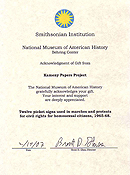The Kameny Papers Project received this certificate from the Smithsonian Institution:

Click the above image to see a full-size pdf version of this "Acknowledgement of Gift".

Provenance:
The source of the KamenyPapers is Frank Kameny himself; these papers come from a lifetime collection, which has remained in the attic of his residence.
Dr. Kameny is the sole owner of the archive; he has personally authorized this effort to preserve and donate his papers. We are his agents to accomplish this effort, and will receive no payment or commission, beyond approved expenses. |
|
|
Frank Kameny Writes Tom Brokaw
Dr. Franklin Kameny
Kameny Papers Project
November 26, 2007
Mr. Tom Brokaw
c/o Random House Publishing Group
Ms. Gina Centrello
Publisher
Random House Publishing Group
Ms. Kate Medina
Executive Editorial Director
Random House Publishing Group
1745 Broadway
New York , New York , 10019
Dear Mr. Brokaw and Mmes. Centrello and Medina:
As a long-time gay activist, who initiated gay activism and militancy at
the very start of "your" Sixties, in 1961; coined the slogan "Gay is Good"
in 1968; and is viewed by many as one of the "Founding Fathers" of the
Gay Movement, I write with no little indignation at the total absence of
any slightest allusion to the gay movement for civil equality in your book “Boom! Voices of the Sixties". Your book simply deletes the momentous events of that decade which led to the vastly altered and improved status of gays in our culture today. This change would have
been inconceivable at the start of the Sixties and would not have
occurred at all without the events of that decade totally and utterly
ignored by you. Mr. Brokaw, you have "de-gayed" the entire decade. "Voices of the
Sixties"??? One does not hear even one single gay voice in your book. The silence
is complete and deafening.
As a gay combat veteran of World War II, and therefore a member of the "Greatest Generation", I find myself and my fellow gays as absent from
your narration as if we did not and do not exist. We find Boom! Boom!!
Boom!!! in your book about all the multitudinous issues and the vast
cultural changes of that era. But not a single "Boom", only dead
silence, about gays, homosexuality, and the Gay Movement.
The development of every other possible, conceivable issue and cause
which came to the forefront in that period is at least mentioned, and is
usually catalogued: race; sex and gender; enthnicity; the environment;
and others, on and on and on -- except only gays.
In 1965, we commenced bringing gays and our issues "out of the closet"
with our then-daring picketing demonstrations at the White House and
other government sites, and our annual 4th of July demonstrations at
Independence Hall in Philadelphia . The Smithsonian Institution displayed these original pickets last month, in the same exhibition as the desk where Thomas Jefferson drafted The Declaration of Independence. The name of the Smithsonian's exhibition? “Treasures of American History”. In your book: No Boom; only silence.
About 1963, a decade-long effort commenced to reverse the psychiatric
categorization of gays as mentally or emotionally ill, concluding in
1973 with a mass "cure" of all of us by the American Psychiatric
Association. No boom in your book; only your silence.
The most momentous single Gay Movement event occurred at the end of
June, 1969, when the "Stonewall Rebellion" in New York , almost overnight
(actually it took three days) converted what had been a tiny, struggling
gay movement into the vast grass-roots movement which it now is. We had
five or six gay organizations in the entire country in 1961; fifty to
sixty in 1969; by the time of the first Gay Pride march, in New York
one year later in 1970, we had 1500, and 2500 by 1971 when counting
stopped. If ever there was Boom, this was it. In your book, no Boom,
only your silence.
About 1972, Elaine Noble was elected to the Massachusetts state House of Representatives as the first elected openly gay public official. I had
run here in Washington , DC , the previous year for election to Congress
as the first openly gay candidate for any federal office. Harvey Milk
was elected to the Board of Supervisors in San Francisco . No boom in
your book; only your silence.
Mr. Brokaw, you deal with the histories of countless individuals. Where are the
gays of that era: Barbara Gittings; Jack Nichols; Harry Hay; Del Martin
and Phyllis Lyons; Randolfe Wicker; Harvey Milk; numerous others? No
booms in your book; only silence and heterosexuals.
Starting in 1961 a long line of court cases attacked the long-standing
U.S. Civil Service Gay Ban (fully as absolute and as virulent as the
current Military Gay ban, which actually goes back some 70 years and was
also fought in the 60s) with final success in 1975 when the ban on
employment of gays by the federal government was rescinded. In your
book, no boom; only your silence.
The assault on the anti-sodomy laws, which made at least technical
criminals of all gays (and most non-gays for that matter, although never
used against them) and which was the excuse for an on-going terror
campaign against the gay community through arrests the country over,
began in 1961 and proceeded through the 60s and onward. In your book,
no boom; only your silence.
In 1972, following up on Stonewall, the first anti-discrimination law
protective of gays was enacted in East Lansing, Michigan, followed by
the much more comprehensive one in D.C. in 1973, starting a trend which
now encompasses some twenty states, countless counties and cities, and has
now reached Congress in ENDA. In your book, no boom; only your silence.
The Sixties were a period of unprecedented rapid social and cultural
upheaval and change. We gays were very much a part of all that. A
reader of your book would never have the slightest notion of any of
that. In your book, no boom; only your silence.
At the start of the Sixties gays were completely invisible. By the end, and
especially after Stonewall, we were seen everywhere: in entertainment,
education, religion, politics, business, elsewhere and everywhere. In
BOOM our invisibility remains total.
The only allusions to us, in your entire book are the most shallow,
superficial, brief references in connection with sundry
heterosexuals. Where are the gay spokespeople? We are certainly there
to speak for ourselves. But in your book, only silence.
Mr. Brokaw, I could go on, but this should be sufficient to make my point. The
whole thing is deeply insulting. As I said, you have de-gayed an entire
generation. For shame, for shame, for shame. You owe an abject public
apology to the entire gay community. I demand it; we expect it.
Gay is Good. You are not.
Sincerely,
Franklin E. Kameny, Ph.D.
Dr. Franklin Kameny
5020 Cathedral Ave. , NW
Washington , D.C. 20016
FEKameny@webtv.net
202.362.2211
Kameny Papers Project
www.kamenypapers.org
Howard Kurtz
The Washington Post
kurtzh@washpost.com
Dr. Harry Rubenstein
Curator,
National Museum of American History
The Smithsonian Institution
Washington , D.C.
rubensteinh@si.edu
Dr. John Haynes
Curator, Manuscript Division
Library of Congress
jhay@loc.gov
Mr. Dudley Clendinen
Author, Out for Good
Baltimore , Md.
FindDudley@aol.com
Mr. Stephen Bottum
www.bandofthebes.com

|
|


